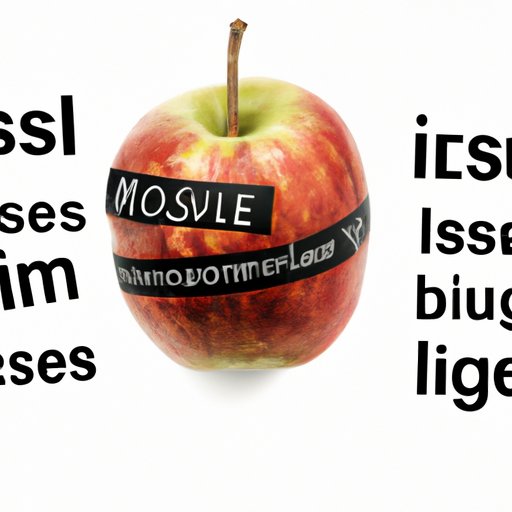
Introduction
Have you ever noticed that you lose a few pounds when you’re sick? The phenomenon of weight loss during illness is not uncommon. While it may appear to be a silver lining to an otherwise unpleasant experience, it can be an alarming occurrence, especially if the weight loss is significant. This article aims to explore the science behind why we lose weight when sick and the implications of illness-related weight loss on our bodies.
Explore the Science Behind Weight Loss During Sickness
When the body is fighting an illness, its metabolic rate increases. That means the body is using more energy to support the immune system’s response to the illness. This increase in metabolic rate causes the body to burn more calories than usual, leading to weight loss.
Moreover, a fever is a common symptom of many illnesses. The increased body temperature also increases metabolic rate, causing more calories to be burned. Additionally, inflammation is a regular occurrence during sickness, and it can lead to weight loss. The immune system produces various compounds that can affect appetite, and it may cause a decrease in appetite.
Understanding Your Body’s Immune Response to Shedding Pounds
The immune system plays a significant role in illness-related weight loss. When the body is fighting an infection, it uses stored fat as an energy source to support the immune response. The process of using fat as an energy source results in weight loss. It’s important to note that this process is not without drawbacks. The body is more susceptible to muscle loss during this time, and it may weaken the immune response in the long run.
The Connection between Illness Symptoms and Weight Loss
Illness symptoms have a direct impact on weight loss. Symptoms such as nausea, vomiting, diarrhea, and loss of appetite affect calorie intake, which results in weight loss. When these symptoms are severe, they can lead to significant weight loss, which can be detrimental to health if not monitored and treated appropriately. Therefore, it’s important to keep track of symptoms, especially during a sickness-related weight loss episode.
The Role of Appetite Loss in Weight Reduction During Sickness
Appetite loss is a critical factor in weight loss during sickness. It’s common to lose appetite when feeling unwell, and it can be challenging to consume enough calories to maintain a healthy weight. The amount of weight loss depends on the severity of the loss of appetite. Furthermore, some people experience more significant weight loss than others during sickness, depending on the severity of the illness and the body’s response.
To manage appetite loss during sickness, it’s important to consume small and frequent meals and snacks throughout the day. This approach can be helpful in maintaining adequate calorie intake and avoiding significant weight loss. Consuming nutrient-dense foods such as soups, broths, and smoothies can also provide the body with the vitamins and minerals it needs to support the immune response.
Temporary vs Permanent Effects of Illness-Related Weight Loss
Sickness-related weight loss can be temporary or permanent. In most cases, the weight loss is temporary and is regained once the illness has passed. However, for individuals with chronic illnesses or severe infections, the weight loss can be permanent. Furthermore, some people regain the weight loss even after the illness has subsided. It’s important to maintain healthy habits to prevent weight regain and future illness-related weight loss.
The Importance of Proper Nutrition to Help Your Body Fight Sickness
Nutrition plays a crucial role in immune system function and recovery from sickness. During a sickness-related weight loss episode, it’s essential to consume nutrient-dense foods to support the immune response. Nutrients that are particularly important during sickness include protein, vitamin D, vitamin C, and zinc.
To maintain proper nutrition during sickness, focus on lean proteins, whole grains, and a variety of fruits and vegetables. If nausea, vomiting, or diarrhea is an issue, consuming clear fluids such as water, tea, or clear broths may be beneficial. However, if you’re unable to keep foods and fluids down, it’s important to seek medical attention to avoid dehydration.
Tips to Help You Maintain Healthy Habits Post-Illness Weight Loss
Maintaining healthy habits is crucial to prevent future illness-related weight loss and promote long-term health. Exercise is an excellent way to prevent weight gain, boost immune function, and reduce stress levels. Consistent exercise, even if it’s light to moderate intensity, can also help build muscle mass, strengthening the immune system as well.
Focusing on a balanced diet that is rich in whole, nutrient-dense foods such as fruits, vegetables, whole grains, and lean proteins can help maintain a healthy weight. Furthermore, managing stress levels through meditation, deep breathing exercises, and other relaxation techniques can help prevent illness-related weight loss.
Conclusion
Illness-related weight loss can be both temporary and permanent, and it can have a significant impact on our overall health. Understanding the science behind weight loss during sickness and making intentional choices to maintain healthy habits can help prevent illness-related weight loss and promote overall health and well-being.
If you experience significant weight loss during sickness or require guidance on how to maintain good nutrition and exercise habits, seek medical attention from a healthcare provider. Doing so can help prevent complications and ensure a speedy recovery.





